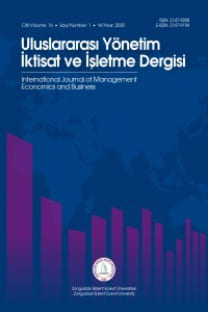Üniversitelerde Gerçekleşen Girişimcilik Faaliyetlerinin Değerlendirilmesi
Girişimcilik, Üniversite Girişimciliği, Akademik Girişimcilik, Girişimci
A REVIEW OF ENTREPRENEURSHIP ACTIVITIES AT UNIVERSITIES
___
- Aldrich, H. E. (2012). The emergence of entrepreneurship as an academic field: a personal essay on institutional entrepreneurship. Research Policy, 41(7), 1240-1248.
- Alexander, U., Evgeniy, P. (2012). The entrepreneurial university in Russia: from idea to reality. Procedia - Social and Behavioral Sciences, 52, 45-51.
- Alpan, G., Efil, İ (2011). Bir yönetim modeli önerisi: Toplam entropi yönetimi. Business and Economics Research Journal, 2(1), 53-87.
- Bramwell, A., Wolfe, D. A. (2008). Universities and regional economic development: the entrepreneurial University of Waterloo. Research Policy, 37(8), 1175-1187.
- Burnett, S. A., Huisman, J. (2010). Universities’ responses to globalisation: the influence of organisational culture. Journal of Studies in International Education, 14(2), 117-142.
- Duval-Couetil, N. (2013). Assessing the impact of entrepreneurship education programs: challenges and approaches. Journal of Small Business Management, 51(3), 394-409.
- Erol, M. (2001). Sosyal Entropi’nin verimlilik üzerindeki etkileri. C.Ü. İktisadi ve İdari Bilimler Dergisi, 2(1), 127-143.
- Gaffikin, F., Morrissey, M. (2008). A new synergy for universities: redefining academy as an ‘engaged institution’. Education, Citizenship and Social Justice, 3(1), 97-116.
- Glassman, A. M., Moore, R. W., Rossy, G. L., Neupert, K., Napier, N. K., Jones, D. E., Harvey, M. (2003). Academic entrepreneurship. Journal of Management Inquiry, 12(4), 353- 374.
- Grimaldi, R., Kenney, M., Siegel, D. S., Wright, M. (2011). 30 years after Bayh–Dole: reassessing academic entrepreneurship. Research Policy, 40(8), 1045-1057.
- Jones, C., Matlay, H. (2011). Understanding the heterogeneity of entrepreneurship education: going beyond Gartner. Education + Training, 53 (8/9), 692-703.
- Klofsten, M. (2000). Training entrepreneurship at universities: a Swedish case. Journal of European Industrial Training, 24(6), 337-344.
- Klofsten, M., Jones-Evans, D. (2000). Comparing academic entrepreneurship in Europe: the case of Sweden and Ireland. Small Business Economics, 14 (4), 299-315.
- Kuratko, D. F. (2005).The emergence of entrepreneurship education: Development, trends, and challenges. Entrepreneurship Theory and Practice, 29(5), 577-598.
- Lazzeroni, M. (2001). Introduzione all’innovazione territoriale. In Lanzara, R., Lazzeroni, M. (a cura di), Metodologie per L’innovazione Territoriale.Un progetto sperimentale nelle aree di Pisa, Benevento, Brindisi e Lecce. (1ª edizione, p. 11-29). Milano, Franco Angeli.
- Lazzeroni, M., Piccaluga, A. (2003). Towards the entrepreneurial university. Local Economy, 18(1), 38-48.
- Louis, K. S., Blumenthal, D., Gluck, M. E., Stoto, M. A. (1989). Entrepreneurs in academe: An exploration of behaviors among life scientists. Administrative Science Quarterly, 34, 110-131.
- Manifet, C. (2008). Academic entrepreneurship in France: the promotion of economic returns of public research and its political and scientific challenges. European Journal of Education, 43(3), 281-300.
- Marion, T. J., Dunlap, D. R., Friar, J. H. (2012). The university entrepreneur: a census and survey of attributes and outcomes. R&D Management, 42(5), 401-419.
- Mars, M. M., Rios, A. (2010). Academic entrepreneurship (re)defined: significance
- and implications for the scholarship of higher education. Higher Education, 59, 441-461.
- Mirabella, R., Young, D. A. (2012). The development of education for social entrepreneurship and nonprofit management diverging or converging paths?. Nonprofit Management and Leadership, 23(1), 43-57.
- Mueller, P. (2006). Exploring the knowledge filter: How entrepreneurship anduniversity– industry relationships drive economic growth. Research Policy, 35(10), 1499-1508.
- Neck, H. M., Greene, P. G. (2011). Entrepreneurship education: known worlds and new frontiers. Journal of Small Business Management, 49(1), 55-70.
- Peters, M. A., Besley, T. A. C. (2008). Academic entrepreneurship and the creative economy. Thesis Eleven, 94, 88–105.
- Philpott, K., Dooley, L., O’Reilly, C., Lupton, G. (2011). The entrepreneurial university: examining the underlying academic intentions. Technovation, 31, 161-170.
- Rasmussen, E. A., Sİrheim, R. (2006). Action-based entrepreneurship education. Technovation. 26(2), 185-194.
- Rothaermel, F. T., Agung, S. D., Jiang, L. (2007). University entrepreneurship: a taxonomy of the literature. Industrial and Corporate Change, 16(4), 691-791.
- Shane, S. (2004). Academic entrepreneurship: university spinoffs and wealth creation. Cheltenham, England: Edward Elgar.
- Solomon, G. (2007). An examination of entrepreneurship education in the United States. Journal of Small Business and Enterprise Development, 14(2), 168-182.
- Styhre, A., Lind, F. (2010). The softening bureaucracy: accommodating new research oportunities in the entrepreneurial university. Scandinavian Journal of Management, 26, 107-120.
- Thornton, P. H. 1999. The sociology of entrepreneurship. Annual Review of Sociology, 25, 19–46.
- Tijssen, R. J. W. (2006). Universities and industrially relevant science: towards measurement models and indicators of entrepreneurial orientation. Research Policy, 35(10), 1569- 1585.
- Urbano, D., Guerrero, M. (2013). Entrepreneurial universities socioeconomic impacts of academic entrepreneurship in a European region. Economic Development Quarterly, 27(1), 40-55.
- Van Burg, E., A. G. L., Gilsing, V. A., Reymen, I. M. M. J. (2008). Creating university spin-offs: a science-based design perspective. The Journal of Product Innovation Management, 25, 114-128.
- Von Graevenitza, G., Harhoffa, D., Weber, R. (2010). The effects of entrepreneurship education. Journal of Economic Behavior & Organization, 76(1), 90-112.
- Wood, M. S. (2011). A process model of academic entrepreneurship. Business Horizons, 54, 153-161.
- Yokoyama, K. (2006). Entrepreneurialism in Japanese and UK universities: governance, management, leadership, and funding. Higher Education, 52, 523-555.
- ISSN: 2147-9208
- Yayın Aralığı: 4
- Başlangıç: 2005
- Yayıncı: Zonguldak Bülent Ecevit Üniversitesi
Üniversitelerde Gerçekleşen Girişimcilik Faaliyetlerinin Değerlendirilmesi
Yılmaz DEMİRHAN, İrfan TÜRKOĞLU
Türk Kamu Yönetiminde Performans Yönetimine Bir Bakış
Ticari Dışa Açıklığın Ekonomik Etkileri: Orta Asya Ülkeleri İçin Ampirik Bir Analiz
Mobilya Sektöründe Bulanık Doğrusal Programlama Tekniği İle Üretim Planlaması Uygulaması
Meltem KARAATLI, Nuri ÖMÜRBEK, Hasan YILMAZ
Türkiye’de İşsizliğin Sosyo-Ekonomik Belirleyicileri: Panel Veri Analizi
Sibel SELİM, Halime Duygu KIRGEL, Orkun ÇELİK, Hakan YAZICIOĞLU
THE CAUSES AND EFFECTS OF THE ORGANIZATIONAL SILENCE: ON WHICH ISSUES THE NURSES REMAIN SILENT?
